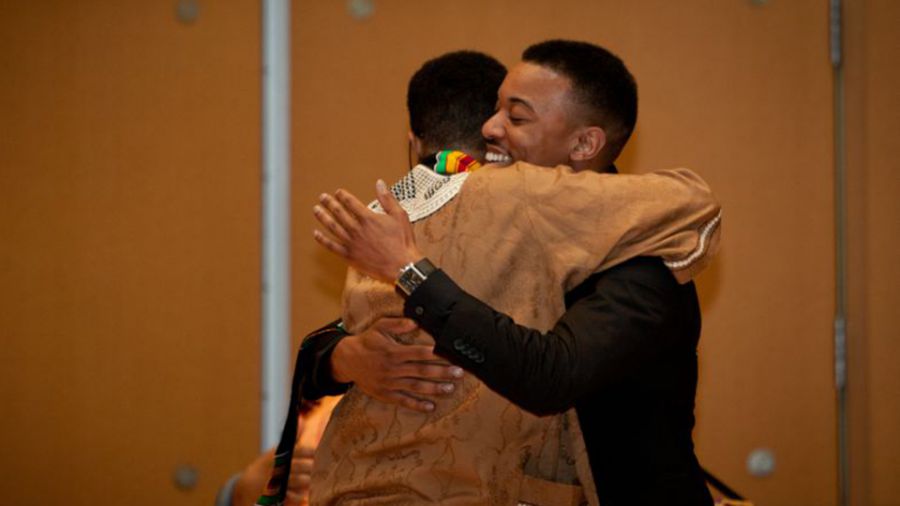Most graduating students eagerly wait for one big day to finally arrive. Anthony T. Williams Jr. had three.
They were his graduate program’s hooding ceremony, his college’s commencement, and then Umoja: Celebration of Black Graduates, an event that’s steeped in its own tradition. Umoja mirrors Illinois State’s main commencement ceremonies in many ways, but it also has many vibrant and culturally distinct differences, such as the inclusion of music, call and response, and dancing.
“We’re very excited to celebrate in the way that our ancestors celebrated,” said Williams, a master’s graduate in college student personnel administration. “It’s not so uptight, not so formal. It’s a chance for family and friends to come out and really celebrate you.
“At the main commencement they tell you, ‘Please hold all applause until the end,’” he added. “If that’s the first person ever in your family to graduate college, how can you be expected to control your excitement? You’re going to be as proud and as loud as you can be. That’s just a small but very important aspect of the (Umoja) celebration.”
Umoja is the Swahili word for “unity,” a fitting name for this pre-commencement celebration of black graduates, now in its second year. The May 8 event, steeped in deep cultural and historical tradition, brought together 79 graduating students and their families and friends at the Center for the Performing Arts. It’s hosted by the Association of Black Academic Employees and the Black Graduate Student Association.
“Umoja, the ceremony as it is conceptualized here at ISU, really was born in the hearts and minds of alumni, staff, faculty, and students,” said Pamela Twyman Hoff, co-chair of the Umoja steering committee and an assistant professor in the Department of Educational Administration and Foundations. “We wanted to use that principal to guide us in creating and developing a celebration for African-American students in an African-American cultural context.”

Master’s graduate Anthony T. Williams Jr. and other graduating students celebrate with dance as a part of the procession at Umoja on May 8.
This year’s Umoja (pronounced Um-OH-juh) theme was the three R’s of black education: resistance, resilience, and reciprocity. During the ceremony graduates names are called while music plays. A confident walk, strut, or dance across the stage is encouraged, and graduates receive a certificate of achievement and a Kente cloth.
The Kente cloth, which has its roots in many West African countries, is a hand-woven fabric and typically worn during ceremonies and other special events.
“Students receive this as a way of reminding them that they are connected to a larger cultural diaspora,” said Hoff. “We have that historical and cultural connection as well, reminding students that they have a social responsibility and a cultural responsibility to give back to the community.”
Graduating senior Shacoby Henderson, who studied psychology, wants to do just that, and her commitment will soon take her around the world.
“Even though I’m about to graduate, and I’ve done enough in my community in college that I want to go outside that,” said Henderson. ”I’m going to Ghana for three weeks to work in orphanages and to help with HIV/AIDS patients. After, I want to go to graduate school for social work, to work with children with disabilities.”
Another graduating senior, Jordan Strickland, who also studied psychology, plans to follow a similar path.
“I’m feeling excellent right now,” Strickland said. “I’m planning on getting a position with City Year. It’s (an AmeriCorps) program where you go back and you help schools out in the inner city. It’ll be nice to able to go back and show kids there that you can make it out of trying situations.”
Cultural celebrations like Umoja take place at universities all across the country.
“At many universities, depending where it’s located geographically, you’ll see Native American students being honored from their cultural perspective, or you’ll see Chicanos (or Latinas) honoring their students. This is a cultural expression from each group’s own vantage point,” said Hoff.
It’s not an attempt segregate, and all students are able to participate from their own cultural perspective, said Hoff. About 7 percent of Illinois State students are black or African-American.
“Folks can come and participate as long as they understand that this is from a cultural vantage point that is typically marginalized in universities throughout the nation,” she said.
The number of Umoja participants doubled in its second year and will hopefully continue to grow in the years to come, said Hoff.
Andrew Avitt can be reached at asavitt@IllinoisState.edu.

